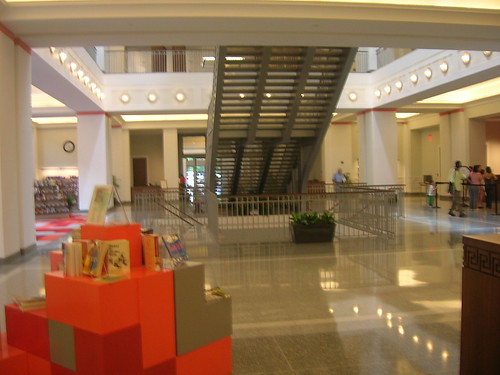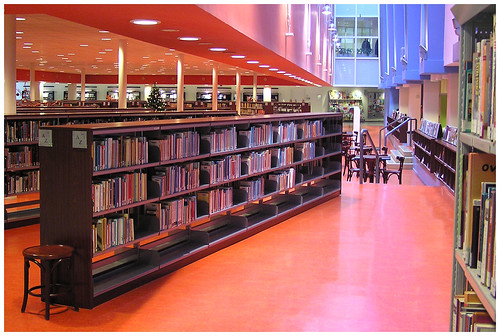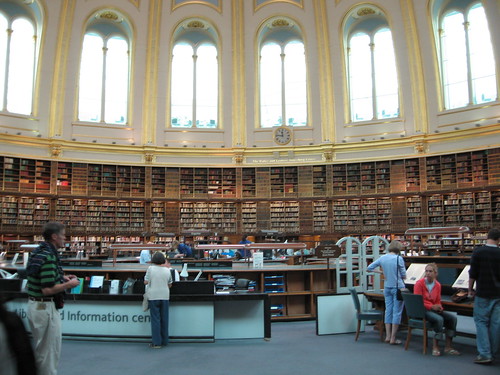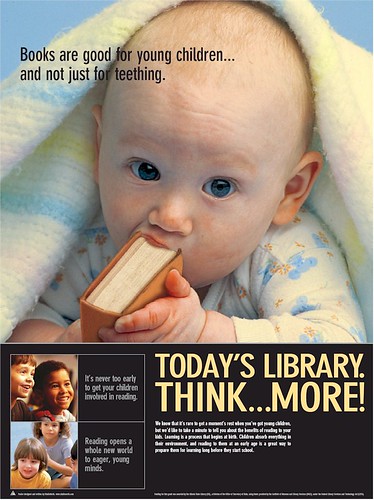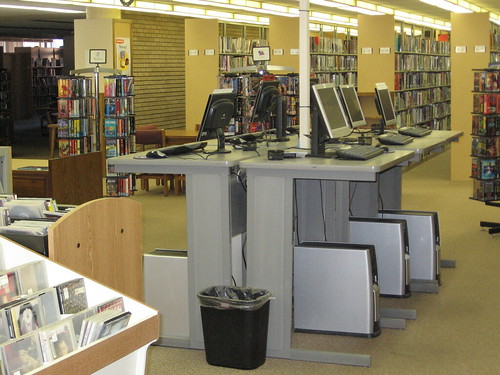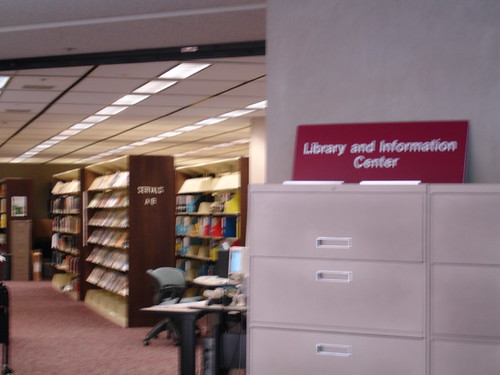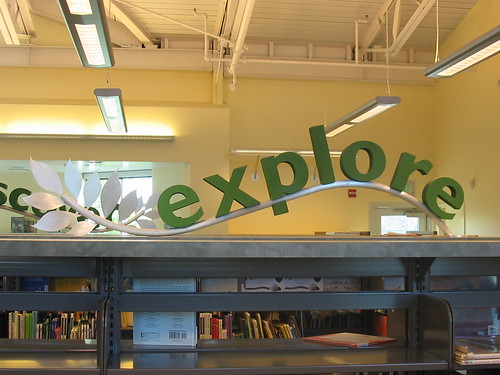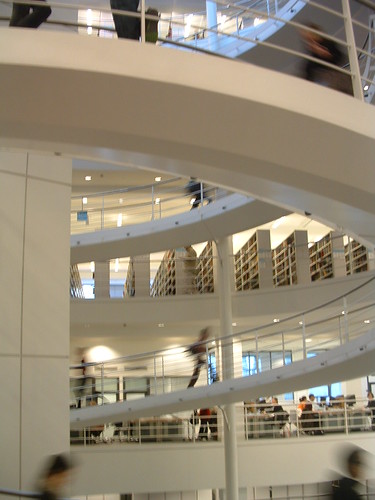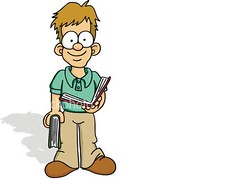Saturday, November 11, 2006
Digital Library of Human Languages
Virtual Library Services-AHML
Use of online means of library patrons receiving answers to reference quetions online through the use of the Arlington Heights Memorial Library website--http://www.ahml.info/
Bodleian Library
Excerpt Video about the Bodleian Library and the benefactors who have supported it over the years. Produced by The Virtual Experience Company
Fedora-compatible open-source software
Fedora community members are actively developing open-source client applications, services, and utilities for use with Fedora repositories and the Fedora Service Framework.
National Library Week Celebrations-KALA-Karnataka, India
Karnataka State Library Association (R )
National Library Week Celebrations
November 14-20, 2006
Theme: Library Services for Quality Education
Organised by :
Karnataka State Library Association (KALA)
in collaboration with
Shankara Rotary, Hippo Campus Library,
Kuvempu University
Karnatak University
Gulburga University
Mysore University
PES Group of Institutions
Infosys Bangalore
JSS Public School, Bangalore
Rajiv Gandhi University of Health Sciences
You are cordially invited.
Programme :
Day 1 :
Inauguration of Library Week Celebrations
14 November 2006 - Tuesday
Chief Guest: Mrs Rohini Nilakeni,
Founder Akshara Foundation, Bangalore
Topic: Libraries and Child Development
Venue: Shankara Rotary Hippo Campus Library,
Ranga Rao Road, Shankarapuram,
Bangalore 560 004
Time: 5.00 pm
Organizer: Mrs. Lakshmi Chinnappa
Day 2:
15 November - Wednesday
Speaker: Prof. T.N. Shankar Narayan
Director
School of Languages
Kuvempu University
Shimoga
Presided by: Dr. B. S. Biradar
Chairman
Department of Library and Information Science
Kuvempu University
Shimoga
Venue: Department of Library Science,
Kuvempu University
Time: 2.30 pm
Day 3:
16 November 2006 - Thursday
Speake -1: Dr. C.V. Satyaprakasha
Principal, PES College of Education
Topic: Role of Libraries in Quality Education
Speaker -2: Dr. Vishnukant S. Chatpalli
Director, Community Development Programmes
PES Institute of Technology
Topic: Community Development through Libraries
Presided by: Prof M.R. Doreswamy
Founder Chairman, PES Group Institutions
Venue: Tech Park Seminar Hall
PESIT,100 Feet Ring Road Bangalore -560085
Time: 3.30 PM
Organizer: Mrs. Gayathri Sen, Librarian, PESIT
Day 4:
17 November 2006 - Friday
Speakers : SV Subramanya
& Topics Quality Services : Users perception (2.15 pm)
JK Suresh
Challenges of Corporate Librarians in Digital Era
(2.30 pm)
High Tea: 2.45 pm
Cdr Jayaram BG
Effective Planning of Optimized use of Library Recourses
(3.00 pm)
Dr Kochikar
Role of Librarians in inculcating Reading habit (3.15 pm)
Venue: Rosabeth Moss kanter Training room, 2nd floor,
Building No 11, MDC Block,
Infosys Technologies Ltd,
Electronics city,
Bangalore - 560100. (Entry point is from Gate No 4)
Time : 2.00PM to 5.00PM
Organizer: Sanjay
Day 5 :
18 November 2006 - Saturday
Speaker : Mr. Umesh Malhothra
Topic: How can you have Fun with Books
Presided by: Shri R.U. Patil, Principal,
JSS Public School
Venue: JSS Public School, Adjacent BDA Complex,
HSR Layout, Bangalore
Time: 10.00 am
Organizer Shri R.U. Patil
Day 6 :
Valedictory Function
20 November 2006 - Monday
Welcome address: Dr . Vasantha Kumar
Key note address: Dr. K. Lakshman
Consultant Surgeon & Expert in Medical Informatics
Lecture: Dr. R. Rama Raj Urs
University Librarian, RGUHS
Topic: Importance of National Library Week
Presided by: Dr. PS Prabhakaran
Vice Chancellor
Rajiv Gandhi University of Health Sciences,
Bangalore
Venue: Dhanvanthry Hall, RGUHS
Bangalore
Time: 4.00 - 5.30 pm
Organizer: Dr. R. Rama Raj Urs
Dr. I.R.N. Goudar
President KALA, Office Bearers and EC Members of KALA
-----------------------------------------------
Dr. I.R.N. Goudar
Sci F & Head, Information Centre for
Aerospace Science and Technology
National Aerospace Laboratories
Airport Road, BANGALORE-560 017 India
Tel 91-80-25086081
91-80-25235315
Fax: 91-80-25268072
E-mail:goudar at css.nal.res.in
http://www.icast.org.in/staff/goudar.html
Symposium: "Transforming Scholarly Communication Symposium-2006"
Symposium: "Transforming Scholarly Communication Symposium"
QuickTime Videos and PowerPoints from the Transforming Scholarly Communication Symposium.
1. Ray English, Director of Libraries at Oberlin College and Chair of the SPARC Steering Committee, kicked things off with a talk on
"The Crisis in Scholarly Communication"
PowerPoint: http://info.lib.uh.edu/scomm/english.ppt
QuickTime Video:
http://mediaweb.uh.edu/nonacademic/lib_symposium_2006/lib01_english_20061004.qtl
and
"Sites and Cites for the Struggle: A Selective Scholarly Communication Bibliography":
--http://info.lib.uh.edu/scomm/englishhandout.pdf
2. Corynne McSherry, Staff Attorney at the Electronic Frontier Foundation and author of Who Owns Academic Work?: Battling for Control of Intellectual Property, spoke on
"Copyright in Cyberspace: Defending Fair Use"
PowerPoint: http://info.lib.uh.edu/scomm/mcsherry.ppt
QuickTime Video:
http://mediaweb.uh.edu/nonacademic/lib_symposium_2006/lib01_mcsherry_20061004.qtl
3. Peter Suber, Research Professor of Philosophy at Earlham College, Senior Researcher at the Scholarly Publishing and Academic Resources Coalition (SPARC), and the Open Access Project Director at Public Knowledge, discussed
"What Is Open Access?"
PowerPoint :http://info.lib.uh.edu/scomm/suber.ppt
QuickTime :
Video:http://mediaweb.uh.edu/nonacademic/lib_symposium_2006/lib01_suber_20061004.qtl
Friday, November 10, 2006
Open access in the developing world: Regaining the lost impact

Medical:Medical Database:MEDLINE®/PubMed® Resources Guide
Medical:Medical Database:MEDLINE®/PubMed® Resources Guide
Resources Gudide Provide detailed information about MEDLINE® data and searching PubMed®..
http://www.nlm.nih.gov/bsd/pmresources.html
| A brief description of MEDLINE, your database of biomedical and life sciences journal citations. See also FAQ: Finding Medical Information in MEDLINE. | |
| A brief description of PubMed, part of the Entrez retrieval system and your free access to MEDLINE. | |
| What is the Difference between MEDLINE and PubMed?(Fact Sheet) | A useful fact sheet to help you understand MEDLINE and PubMed. |
| To help you understand NLM's controlled vocabulary thesaurus. Helpful for searching NLM's databases. See also The Basics of MeSH and Branching Out: The MeSH Vocabulary (instructional video). | |
| How indexing is done at NLM, and information on becoming an indexer. | |
| Where data from NLM's legacy databases went. See also FAQ: Retired Databases. |
...............................................................................
Thursday, November 09, 2006
HELP - World's largest Patient Education Library
Library of the Future
Six minute report on Stanford University’s Digital Library activities --http://www-sul.stanford.edu/
DSpace 1.4.1 beta 1. Released

Release of DSpace 1.4.1 beta 1.
This beta release is primarily a bug fix release incorporating numerous bugs/enhancements. Refer to the CHANGES file within the distribution for the full list of enhancements.
The documentation for this release is bundled within the package.
DSpace 1.4.1 beta 1 can be downloaded from the files area at http://sourceforge.net/projects/dspace/ or from CVS using the tag dspace-1_4_1beta1.
A test instance running the 1.4.1 beta 1 release is available at http://tspacetest.library.utoronto.ca:14080/ along with some sample data. Accounts can be allocated on request to the dspace-dev list if you wish to test admin/access functions.
Those wishing to do development work with DSpace are strongly encouraged to obtain the source code using CVS. This is very straightforward and a guide to doing this is available here:
http://wiki.dspace.org/ContributionGuidelines
Please visit the DSpace Wiki to see the various resources and
collaboration tools available to the DSpace community:
http://wiki.dspace.org/DspaceResources
Atlantis Studios has released the first in a series of comics featuring adventurer-librarian Flynn Carson
Wednesday, November 08, 2006
Workshop on " Application of Instructional Technology to Information Literacy "
DEPARTMENT OF LIBRARY & INFORMATION SCIENCE
AND
DEPARTMENT OF EDUCATION
Jointly Organize A NATIONAL WORKSHOP ON
"APPLICATION OF INSTRUCTIONAL TECHNOLOGY TO INFORMATION LITERACY PROGRAMMES "
INTRODUCTION:
Information Science and Education.
The workshop aims to enable the participants
1. To know the elements of information literacy instruction
2. To know the elements of instructional technology
3. To design a customized training module for a single user or a group
of identified users
4. To assess the effectiveness of their training programme
METHODOLOGY
The resource persons will use lecture method of instruction supported by exercises and activities suitable to the topic covered. Interactive sessions will be held along with each sesion.
WHO SHOULD ATTEND
VENUE
Prof.D.N.Marshall Auditorium, Department of Library & Information Science, Jawaharlal Nehru Library, University of Mumbai, Vidyanagari, Kalina, Santa Cruz (E), 400098.
DATE
30 Nov. – 2 Dec. 2006
*REGISTRATION
Registration Fee : Rs.500/-(including breakfast, lunch, workshop kit and
study material)
Accommodation : Arrangement can be made in the Guest House within University Campus on first come first served basis
*Please send duly filled application forms on the address given.
Contact Persons:
1.Mrs. Ravija Srivastava
Lecturer
Department of Library & Information Science
University of Mumbai
Vidyanagari, Kalina
Santa Cruz (E)
Mumbai 400098
Ph. 91-022-26526679
Mo. 9819325070
E-mail ID : ravija_srivastava@yahoo.com
2.Prof. (Dr.) S.R. Pandya
Head,
Department of Education
University of Mumbai
Vidyanagari, Kalina
Santa Cruz (E)
Mumbai 400098
Ph. 91-022-26526226
Tuesday, November 07, 2006
Open Source Movement and the Use of DSpace Software
National Workshop
on
Open Source Movement and the Use of DSpace Software
During
November 28 -
Organised by
Indian Association of Special Libraries & Information Centres (IASLIC)
P-291, CIT Scheme No 6M, Kankurgachi, Kolkata – 700 054
email : iaslic@vsnl.net, Phone: +91 (33) 2362 9651
Venue
National Institute for the Orthopaedically Handicapped (NIOH)
(Ministry of Social Justice and Empowerment, Govt of
Registration Fees: Rs 4000/- Last date:
-:Contact:-
| Sri Dipak Kumar Nag, Hony General Secretary, IASLIC | Dr Pijushkanti Panigrahi,, Secretary, Education Division, And Coordinator of the Workshop email : panigrahipk@yahoo.com, mobile: +91 94342 43522 | Ms Rupali Sen, Jt Coordinator of the Workshop email: rupali_lot@yahoo.com, |
Presentation:PPT Slides: ILS: Dis-Integrated Library Systems and the Future of Searching
http://www.lib.ncsu.edu/presentations/2006Amigos/amigos.ppt
Monday, November 06, 2006
Internet Tutorials for Librarian
A Basic Guide to the Internet
Understanding the World Wide Web
Checklist of Internet Research Tips
Conducting Research on the Internet
Alphabetical list of Search Engines
Alphabetical list of Subject Directories
Getting Started: Selecting a Tool for Your Search
Boolean Searching on the Internet
The Deep Web
How to Choose a Search Engine or Directory
Searching the Internet: Recommended Sites and Search Techniques
Second Generation Searching on the Web
Using Internet Explorer 6
How to Copy and Paste from a Web Page to Windows WordPad
ScrapBook: Firefox Extension: Save OpenLearn Content
ScrapBook is a Firefox extension, which helps you to save Web pages and manage the collection. Key features are lightness, speed, accuracy and multi-language support. Major features are:
- Save Web page
- Save snippet of Web page
- Save Web site (In-depth Capture)
- Organize the collection in the same way as Bookmarks
- Highlighter, Eraser and various page editing features
- Full text search and quick filtering search
- Text edit feature resembling Opera's Notes
Download here
ScrapBook won 'Most Useful Upgraded Extension' prize in Extend Firefox Contest.
Extend Firefox Contest Winners
" There is also a not totally unrelated issue at the moment with OpenLearn content, in the sense that the URLs for the current materials appear not to be very stable (though I have been told this is something that will be addressed in the near future...) - so while the content may stay up there, it may not be at the place you bookmarked...
Anyway - printing out online materials is one way of getting a persistent copy of onine materials, as is downloading them - although when pages can only be saved one at a time this can be quite a time consuming process.
So this is one area where Scrapbook caught my interest - the ability to download very easily all the pages from a course. So for example, we could go to the index page of an OpenLearn course, which has links to all the course content pages from it, and use those links to download all the course information:" more here
Cell Biology: (ASCB) now offers a source for peer-reviewed, high-quality visual and written resources
Zamzar: Free online file conversion tool
Zamzar allows you to transform your songs, videos, images and documents into a variety of different formats. Using Zamzar you can:
- Make your PDF documents editable by converting them to MS Word
- Convert your ITunes (aac) files to mp3
- Upload up to 5 files at a time to convert simultaneously
- Take advantage of over 150 different conversion types
NLM Classification available in PDF & HTML formats
Download the following three (3) sections:
- Section 1: Introductory Material [179 KB]
- Section 2: Schedules [446 KB]
- Section 3: Index [2 MB]
PDF documents require the use of the Adobe® Acrobat® Reader, which can be downloaded from Adobe's Web site at no charge.
HTML
DOWNLOAD HTML [1,678 KB]
This zip file consists of HTML encoded pages of the NLM Classification.
Library Services by Mobile Phone : SMS tools

We know Mobile technology and mobiles usage are rapidly growing. Libraries could offer manyservices by mobile technology to reach end user this one more opportunity. Short Message Service (SMS). Multimedia Message Service (MMS) Open source tools are given below.
PlaySMS
PlaySMS is a flexible Web-based Mobile Portal System that it can be made to fit to various services such as an SMS gateway, personal messaging systems, corporate and group communication tools
Current Features
- Multiple database engine supported (using PEAR DB)- Available for shared database usage (tables using its own prefix)
- Send SMS to single mobile phone (web2mobile)
- Send SMS broadcasted (bulk SMS) to a group of mobile phones (web2mobiles)
- Support sending flash and unicode message
- Receive private SMS to Inbox (mobile2web)
- Forward single SMS from mobile phone to a group of mobile phones (mobile2mobiles)
- SMS autoreply, for easy autoreplying formatted incoming SMS
- SMS board, forward received SMS to email,html and/or xml page
- SMS command, execute server side shell script using SMS
- SMS custom, forward incoming SMS to custom SMS application
- SMS poll, manage polling system using SMS
- Simple webservices for sending SMS and retrieving delivery reports (ws.php)
- Create your own gateway module other than Gnokii, Kannel or sms server Clickatell
- Easy webbased control panel
Tambur Messaging Gateway is an open source SMS/MMS messaging gateway platform.
Tambur features
Tambur is written in the Java language, and runs on top of the JBoss application server. It utilizes several technologies found in the J2EE specification: EJB's are used for persistence and business logic, JMX provides per-queue management and messages are passed using JMS. These technologies provide Tambur a standards based scalable and extensible ground. Tambur is managed completely through a web-based management interface; no configuration files need to be edited by hand.
Here is a more in-depth break down on different features provided by Tambur:
General
 | Guaranteed-delivery and full message persistence (using JMS) |
 | Traffic accounting and reporting (including configurable accounts) |
 | Management of individual queues through JMX, automatic JMX attribute persistence |
 | HTTP based API for message sending and reception |
 | Full SMS (including WAP-SI) and MMS support |
 | Support for MySQL, Oracle and HsqlDB databases (persistence is done using the EJB layer, so any dbms should work!) |
 | Message relaying over HTTP. Automatic notification (by SMS) if relaying fails. |
Router
 | Powerful router with reg-exp based matcher and message tagging |
 | Routing tables directly editable through web-based management interface |
 | Pluggable router modules (e.g. operator check, service validation, etc.) |
SMS
 | CIMD, SMPP, UCP/EMI, Generic HTTP and Kannel SMSC modules |
 | Unicode and binary message support |
 | WAP-SI support, with content storage |
 | MPL licensed WBXML compiler |
MMS
 | Nokia EAIF and MM7 support |
 | MPL licensed MMS encoding/decoding library |
Easy Messaging Gateway (SMS/MMS/Mail)
Smash
A program to send SMS to mobile phones. Implementing a client/server concept: A server handles the SMS gruntwork while small portable clients submit messages to be sent. Uses a plugin driver system for different operators/protocols.
SMSLibSMSLib is an API library which allows you to send and receive SMS messages via your GSM modem. SMSLib is distributed under the LGPL license and is available for Java and .NET platforms.
SMTP2SMS
SMSEngine
SMSEngine is a java application which is mainly created to send sms to multiple users at once time via mobile phone which is connected to a pc from serial/usb/infrared/bluetooth port. You can load the recieverlist and message content from a text file. If
SMS Viewer
A fully perl written sofware for windows (also stand alone binary code included, so it does not require perl installation to use it) to receive short messages (SMS) sent by mobilephone.Cellular Manager
Manages phonebook and SMS in your mobile phone (cellular) from your own computer. Allows a user to edit and retrieve phonebook in SIM card or memory, send SMS or group SMS and view your phone configurations. Supports all kind of phones; supports unicode.Article: AJAX (Asynchronous JavaScript and XML):What’s in it for Libraries?
AJAX (Asynchronous JavaScript and XML): This Isn’t the Web I’m Used To By Jason A. Clark
excerpt:
What’s in it for Libraries?
Libraries and information agencies have been slower to embrace Ajax, but it’s not for a lack of library-use cases. In a library setting, Ajax could be used for speeding up digital library search applications using a link to activate a process that matches multiple ISSNs to compile a list of electronic journals, or even making quick requests to validate a user’s personal information as they log into a “My accounts” section of the catalog.
Let’s look at registering for an Interlibrary Loan (ILL) and requesting a book. Say Susan, a hypothetical academic library user, needs to perform these tasks. In a traditional Web interaction, she would have to navigate through the registration form to enter data for basic contact info, a username, and a password. She might have to submit possible usernames, wait for the form to talk to the server, only to come back and tell her that the username she entered is taken—at which point she also realizes that every bit of data she entered into the form has disappeared. An Ajax Web interaction can provide shortcuts to this process. Rather than sending the whole form to the server for an answer, the Ajax method sends a request on the piece of the form in question behind the scenes to see if Susan’s chosen username is already in use. Because the response from the server is returned almost immediately, Susan receives instant feedback telling her to choose another username. There’s no loss of data or waiting for pages to reload for an answer."
Full Article: http://www.infotoday.com/online/nov06/Clark.shtml


